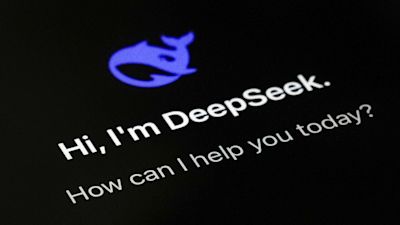Why experts are urging caution over new Chinese AI chatbot DeepSeek

The Chinese artificial intelligence (AI) company DeepSeek has rattled the tech industry with the release of free, cheaply made AI models that compete with the best US products despite having been developed for a fraction of the budget of its big US rivals.
Security experts are urging people to be cautious if using the AI chatbot given its links to China and potential implications for personal data as a result.
Australia’s former cybersecurity minister said national security agencies will soon issue formal guidance for users and US officials are examining the app’s “national security implications”.
Bill Conner, chief executive of automation firm Jitterbit, and a former security adviser to UK and US governments, said DeepSeek “represents a clear risk to any enterprise whose leadership values data privacy, security and transparency”.
“Proactive and privacy-minded enterprises should do strict due diligence with all large language models (LLMs) and AI services, not just DeepSeek,” he said.
“But in this case, and as stated in their own privacy policy, DeepSeek is a shared cloud service run in China with data being stored in China — potentially introducing unknown risks to data privacy, compliance mandates and security controls.”
Chinese tech, from Huawei to TikTok, has repeatedly been the subject of sanctions in recent years because of fears of data being harvested by the Chinese government for intelligence purposes.
What data does DeepSeek keep?
According to DeepSeek's own privacy policy, external, it collects large amounts of personal information collected from users, which is then stored "in secure servers" in China.
This may include:
Your email address, phone number and date of birth, entered when creating an account
Any user input including text and audio, as well as chat histories
So-called "technical information" - ranging from your phone's model and operating system to your IP address and "keystroke patterns".
It says it uses this information to improve DeepSeek by enhancing its "safety, security and stability".
It will then share this information with others, such as service providers, advertising partners, and its corporate group, which will be kept "for as long as necessary".
What are the experts warning?
Industry analysts at Forrester echoed concerns, with several of its experts noting in a joint blog post that DeepSeek’s privacy policy acknowledged the app collected user data and could share it with “public authorities at its discretion”.
“The massive downloads of DeepSeek mean that thousands – and even millions of users – are experimenting and uploading what could be sensitive information into the app,” the analysts said.
“According to its privacy policy, DeepSeek explicitly says it can collect ‘your text or audio input, prompt, uploaded files, feedback, chat history, or other content’ and use it for training purposes.
“It also states it can share this information with law enforcement agencies and public authorities at its discretion.
“Educate and inform your employees on the ramifications of using this technology and inputting personal and company information into it.”
So, is it safe?
Much of the cause for concern around DeepSeek comes from the fact the company is based in China, vulnerable to Chinese cyber criminals and subject to Chinese law.
Professor Allen Tucker, professor of artificial intelligence and head of the intelligent data analysis group at Brunel University of London, said AI chatbots in general should be approached with caution.
Comparing DeepSeek with market leader ChatGPT, Professor Tucker said: "Both have been designed with no use-case in mind.
"They are essentially toys to make people go ‘wow’ rather than solve any genuine problem.
"They are also both deeply embedded in their countries’ politics and therefore need to be treated with a great deal of caution – try asking either of them about controversial topics and they will cover up, change topics or shut down the conversation."
Want a quick and expert briefing on the biggest news stories? Listen to our latest podcasts to find out What You Need To Know...